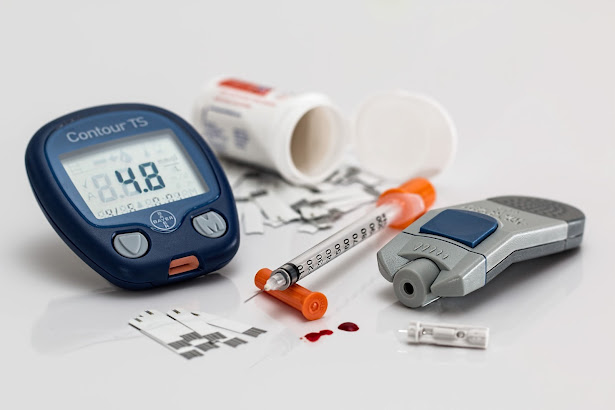Diabetes is a metabolic disorder characterized by high levels of sugar (glucose) in the blood. The body uses glucose as its main source of energy but in order for the glucose to get into the cells, the hormone insulin is required. There are two main types of diabetes: Type 1 diabetes, in which the body does not produce enough insulin, and Type 2 diabetes, which occurs when the body becomes resistant to insulin. Both types of diabetes can lead to serious health complications such as heart disease, stroke, nerve damage, kidney damage, and blindness if left untreated. Symptoms of diabetes include frequent urination, excessive thirst, blurred vision, fatigue, and slow healing of wounds.
( 1 ) Lifestyle changes: This includes maintaining a healthy diet, regular exercise, and maintaining a healthy weight.
( 2 ) Medications: Oral medications such as metformin and GLP-1 receptor agonists, and injectable medications such as insulin can help control blood sugar levels.
( 3) Bariatric surgery: This surgery can help in weight loss and can improve diabetes in some people.
( 4 ) Continuous glucose monitoring: This involves using a sensor to continuously monitor blood sugar levels and make adjustments to insulin doses as needed.
( 5 ) Diabetic retinopathy: Regular eye exams can help detect and prevent diabetic retinopathy, a complication of diabetes that affects the eyes.
( 6 ) Diabetic neuropathy: Regular check-ups with a neurologist can help detect and prevent diabetic neuropathy, a complication of diabetes that affects the nerves.
( 7 ) Diabetic nephropathy: Regular kidney function tests can help detect and prevent diabetic nephropathy, a complication of diabetes that affects the kidneys.
( 8 ) Diabetic foot care: Regular foot exams can help detect and prevent diabetic foot complications, such as foot ulcers and amputations.
( 9 ) Support groups: Joining a support group can provide emotional and social support for people living with diabetes.
( 10 ) Education and self-management: Learning about diabetes and how to manage it is an important aspect of diabetes treatment and management.
Chapter 2
( 1 ) Lifestyle changes: This includes eating a healthy diet, regular physical activity, and maintaining a healthy weight.
( 2 ) Medications: Oral medications and insulin injections are used to control blood sugar levels.
( 3 ) Monitoring: Regular monitoring of blood sugar levels is important to ensure that the treatment plan is working effectively.
( 4 ) Education: Learning about diabetes and how to manage it is an important part of treatment.
( 5 ) Support: Support from family, friends, and healthcare professionals can help individuals with diabetes better manage their condition.
( 6 ) Complications management: Regular checkups and screenings for diabetes complications, such as eye and kidney disease, can help prevent or delay their onset.
( 7 ) Bariatric surgery: In some cases, bariatric surgery may be recommended as a treatment option for obesity-related diabetes.
( 8 ) Incretin-based therapy: Incretin-based therapies, such as GLP-1 receptor agonists and DPP-4 inhibitors, can help improve blood sugar control in type 2 diabetes.
( 9 ) Continuous glucose monitoring: Continuous glucose monitoring devices can help individuals with diabetes better manage their blood sugar levels.
( 10 ) Clinical trials: Participation in clinical trials can provide access to new treatments and help advance diabetes research.
Click This Link

Comments
Post a Comment